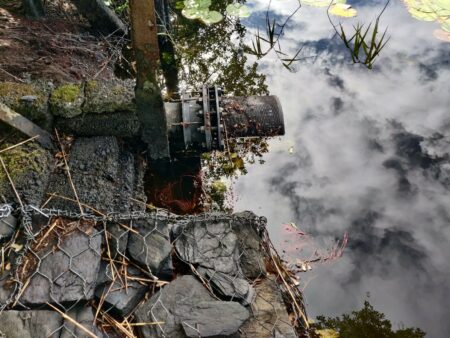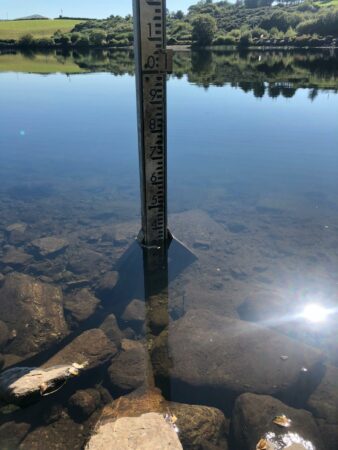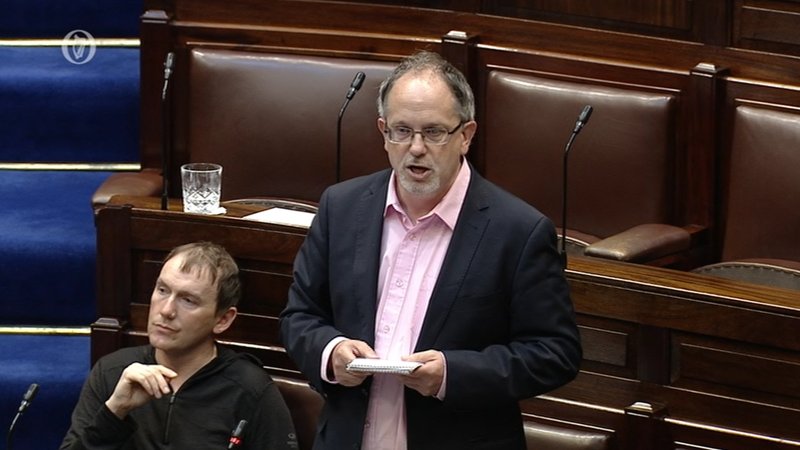29 August 2022
By Tom Collins
tom@TheCork.ie
Irish Water has confirmed that a Water Conservation Order, commonly referred to as a hosepipe ban, will be in place for 30 supplies in West Cork, from midnight tonight for a period of four weeks. The order applies only to these locations and not the rest of the country.
The Water Conservation Order has been issued in a bid to safeguard water supplies for essential purposes. Advertisements will appear in national papers today, August 29, in line with statutory requirements outlining the prohibition of the use of garden hoses and other non-essential uses of water.

Historic low levels of rainfall have impacted on water levels in many sources, including Lake Cross (pictured) which supplies Skibbereen.

Historic low levels of rainfall have impacted on water levels in many sources, including Lake Bofinna (pictured) which supplies Bantry.
The implementation of this Order follows a long period of dry weather combined with a large increase in demand, as a result of which water supplies in West Cork have come under severe stress.
Since November 2021 rainfall in West Cork has been below average for every month (except last June) when compared to historical rainfall records. This has impacted water resources as they need time to replenish, and it will take six to eight weeks of rainfall to do that. There was only 6.3mm of rain at the weather station in Roches Point between August 14 and 23, compared with 18.4mm in Mullingar, Co Westmeath and over 32mm in Markree Castle, Sligo. Met Éireann is forecasting a further spell of dry, warm weather for the next two weeks, which will increase the pressure on already depleted water supplies.
At the same time demand for water has increased significantly over the summer period, particularly in tourist and agricultural areas. Irish Water, in partnership with Cork County Council, is currently tankering water to three supplies and there is a potential need for tankering to additional supplies in the West Cork area in the next two weeks.
Comment from Margaret Attridge of Irish Water
“Irish Water’s top priority is to protect our water supply for use in homes, businesses and essential services. Water levels at our surface water and ground water sources in the West Cork area have reduced to historic lows. As demand continues to outstrip supply in West Cork and with further dry weather predicted, we have taken the extra step of implementing a Water Conservation Order to safeguard local water supplies.
“It is very clear from Irish Water’s data that warm weather creates a surge in demand for water. Such weather makes the use of hoses more likely for gardening, leisure and other purposes. However, using a hosepipe for one hour is the equivalent of the daily water usage of an average family and this is generally a non-essential use of water.
“The introduction of this Order follows a series of measures that Irish Water has put in place to safeguard supplies over the summer, including tankering water to reservoirs, nightime shut offs in some areas, pressure management and a public information campaign aimed at raising awareness of the importance of water conservation year-round. We will continue to analyse water consumption levels while the Water Conservation Order is in place. It is essential that our water supply is protected if we are to avoid restrictions and outages over the coming weeks and months.
“During this time we are supporting and advising our commercial water users on water conservation, and encouraging them to continue their efforts to avoid unnecessary use. We are also working with our partners in Cork County Council to ramp up leak detection and repair, particularly in water stressed areas.
“There are lots of helpful tips for conserving water on water.ie but the key messages are to leave the hose and the pressure washer in the shed; reuse household water for the garden; and take shorter showers. We are calling on everyone to play their part so we can maintain supplies into the Autumn.
The Conservation Order prohibits the use of garden hosepipes and other non-essential uses of water by domestic users and commercial premises for non-commercial activities, for example watering gardens attached to a business premises. Irish Water have published a Map showing the affected areas in West Cork.
To help people learn more about saving water Irish Water has developed an easy-to-use conservation calculator so they can work out how much water they are currently saving and how they can conserve even more. The calculator is available on the Irish Water website at www.water.ie/calculator where you can also find lots of useful water saving tips.
Members of the public can report any leaks in the public water network by contacting Irish Water 24/7 at 1800 278 278 or on water.ie
Water Conservation Order
The prohibited uses are as follows:
Use of water drawn through a hosepipe or similar apparatus for the purpose of –
- watering a garden
- cleaning a private motor-vehicle using a domestic hosepipe
- cleaning a private leisure boat
- filling or maintaining a domestic swimming or paddling pool (except when using hand held containers filled directly from a tap)
- filling or maintaining a domestic pond (excluding fish ponds)
- filling or maintaining an ornamental fountain (with the exception of such use for commercial purposes)
- filling or replenishing an artificial pond, lake or similar application.
This prohibition will apply from 00:01am Tuesday, August 30 until 11:59pm on Monday, September 26 2022.
The list of the supplies to which the Order applies is provided below:
| Adrigole | Dunmanway |
| Allihies | Durrus |
| Bantry | Dursey Island |
| Bayview | Glengarriff |
| Caheragh | Goleen |
| Cahermore | Johnstown |
| Cape Clear | Kealkill |
| Castletownbere | Kilcrohane |
| Clonakilty | Lyre Clonakilty |
| Cluain Court Allihies | Reenmeen West |
| Coppeen | Skibbereen |
| Crookhaven | |
| Crosterra | Tarleton |
| Drinagh | Toormore |
| Dromore Bantry | Whiddy Island |
Overall national situation
Irish Water has been carefully monitoring all of its raw water sources throughout the summer, that is the water from lakes, rivers, springs and ground sources that feed our water treatment plants. While the majority of Ireland’s 750 public water supplies continue to meet the demand for water supply, there are 40 locations nationwide where Irish Water is implementing measures to maintain supplies. These include West Cork as outlined, and also parts of Wexford, Galway, Kerry and Tipperary. However, the Water Conservation Order only applies to the West Cork supplies. In the other areas experiencing drought, the situation is not as serious as in West Cork and Irish Water, with our local authority partners, have been able to maintain supplies to date through interventions such as tankering to reservoirs and pressure management.
Soil Moisture Deficit
Soil moisture deficit is defined as the amount of rain needed to bring the soil moisture content back to field capacity. Soil moisture deficits range between 60 and 76 mm in the south of the country, as of August 23. A soil moisture deficit of 60 to 75mm means that, when it rains, the soil in that area will try to absorb the first 60 to 75 mm of rainfall, before excess can run off or percolate through the land to recharge natural water bodies (lakes, rivers and aquifers) and replenish the sources of water for the Public Water Supply. Therefore it will take several weeks of rainfall before water sources would begin to recover.



